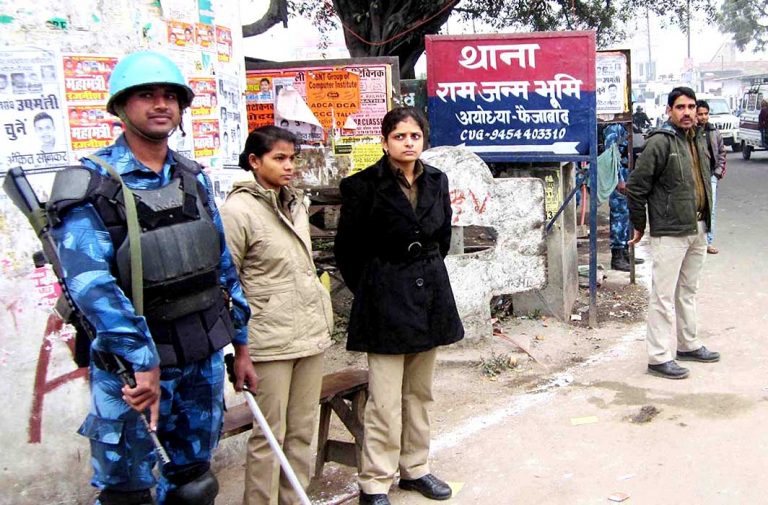
Arguments in the Ram Janmabhoomi–Babri Masjid case continued for the fifth day on Tuesday before a constitution bench in the Supreme Court headed by CJI Ranjan Gogoi and consisting Justices SA Bobde, DY Chandrachud, Ashok Bhushan and S A Nazeer
for the fifth day.
The post lunch session saw arguments between the CJI and senior advocate Rajeev Dhawan with the latter saying that the advocate for the Ram Lalla Virajman was only reading the judgements and not producing any evidence or exhibits. The CJI replied by saying that it was his weak point .” WE will listen to you as well Mr Dhawan”. The CJI said. The CJI assured that the bench was not in a hurry. “WE will hear all arguments at length and all counsels will get time to argue their cases”, he said.
Senior advocate CS Vaidyanathan, appearing for deity Ram Lalla Virajman, advanced arguments on whether there was an existing temple over which the mosque came up, before a five-judge constitution bench headed by Chief Justice Ranjan Gogoi.
He answered query of the bench as to when there is a joint possession and if he is claiming that the other party does not have exclusive possession then how would he prove his exclusive possesseion. Vaidyanathan submits that Joint possession here is in the sense of devotee of the temple and the devotees offering prayer in the mosque.
There are findings of the court which has observed that the place itself is a deity and the deity is the owner of the place. Justice Chadrachud says “there are two views that the place itself is the deity that is the birthplace of Ram and the other argument is that the place is a place of worship. If it is so how are you going to balance both the arguments?”
Vaidyanathan says “I submit that there is no joint possession, the place itself is the deity.”. To which the bench retorted: “ You cannot have destruction, mutilation or division of deity and the place itself is a deity and hence there cannot be division. The construction of the Mosque does not result in the division of the place, Vaidyanathan”.
They continued to worship the place despite the construction of Mosque and therefore they continued their faith in the deity that is the birthplace of Ram and that cannot be destroyed by the construction of the Mosque, Mr Vaidyanathan
Earlier, refuting the claims of the Muslim side, he said, “[The] Muslim side claims they have been in exclusive and continuous possession of the disputed site for 438 years. Therefore have right to the property. But the HC judgment has also found that Muslims did not have exclusive and continuous possession. There has been joint possession.”
He added, “[There is] no need for actual presence of idol, belief and faith of Hindu persons make the place holy. Medieval travelogues by foreign travellers mention parikrama by Hindu devotees at the Ram janmabhoomi. This indicates that the practice of worship in the outer courtyard continued. There is no proof that between 1856 and 1949 there was only a mosque. The evidence will show that between 1855 and 1934 there is no proof that namaaz was actually offered in the mosque.”
Three judges of the Allahabad High Court had held that there was a temple at the disputed site, Vaidyanathan told the bench.
Fourteen appeals have been filed in the apex court against the 2010 Allahabad High Court judgment, delivered in four civil suits, that the 2.77 acre land in Ayodhya be partitioned equally among the three parties — the Sunni Waqf Board, the Nirmohi Akhara and Ram Lalla.
–India Legal Bureau

